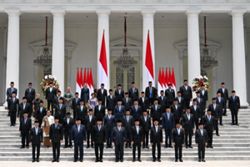
The Vietnamese government has implemented numerous preferential policies, aimed at supporting renewable energy. — VNA/VNS
HANOI: Without a long-term strategy and faster localisation, Vietnam’s energy sector could very well fall short in the competition for renewable energy market share on home ground, say industry insiders and experts.
In a recent study by UK-based think tank Ember, Vietnam accounted for 69% of all solar and wind power output in Asean in 2022, which was estimated at 50 terawatt hours.
Vu Chi Mai, director of Clean, Affordable and Secure Energy for South-East Asia (Case), a programme that drives change in the South-East Asian power sector towards an increased ambition concerning climate change mitigation, said the South-East Asian country’s stable socio-political environment makes it among some of the most attractive investment destinations for solar and wind power business in the region.
In addition, the Vietnamese government has implemented numerous preferential policies, aimed at supporting renewable energy, paving the way for the development of a substantial market and workforce.
Mai said the country had the potential to promote domestic market localisation, with the proportion increasing from 45% to nearly 80% for solar power and from 37% to 55% for wind power by 2050. The value of localisation could reach US$80bil, or 50% of the total market potential.
However, participation by Vietnamese businesses in the industry has been somewhat lacklustre. Consequently, the market share, valued at billions of dollars, remains predominantly in the hands of foreign enterprises.
According to experts from Case, the current supply capabilities of domestic enterprises in the renewable energy sector are limited, with the onshore wind sector in Vietnam lacking the production of nacelles (wind turbine housing), hubs, rotor blades, and underwater cables have not been produced.
Statistics showed that 90% of equipment for renewable energy projects is still imported.
Contributing factors included a lack of assessment capacity, and infrastructure, in addition to insufficient technological capabilities and production levels that do not meet the requirements.
Moreover, the industrial support policies for renewable energy are still inadequate.
Industry insiders and experts have long called for a faster rate of localisation and less dependence on foreign companies.
A case study that may be useful for Vietnam is China.
When European wind turbine manufacturers went to China, the country also required them to meet a certain level of localisation and transfer specific technologies.
As a result, China’s renewables developed rapidly and rose to become the global leader in the solar energy sector.
Currently, China’s GoldWind, a wind power generation company, holds the second-largest share of the global market.
In a very short period, China achieved this because of its favourable policies encouraging localisation.
This served as a lesson for Vietnam to “follow, but lead” by setting conditions for renewable energy technology leaders to hold the leading technology, Mai said.
In addition, to absorb technology from foreign direct investment regions, businesses need to continue evaluating the capabilities of companies in the wind and solar value chain, including support industry enterprises. — Viet Nam News/ANN











































